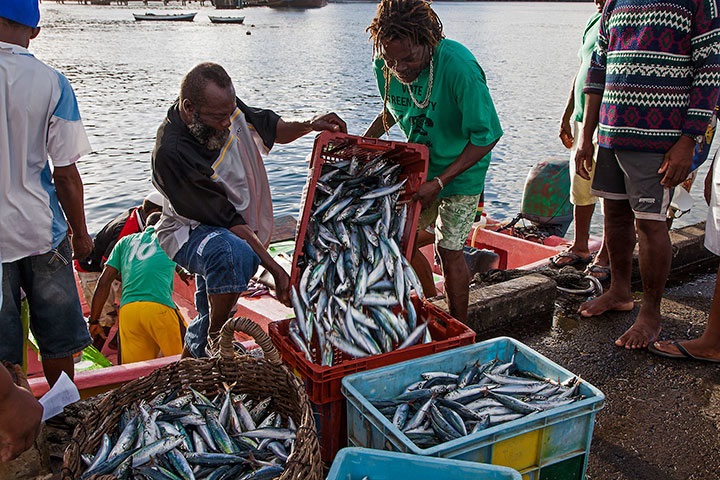|

|
 |
|
Last Updated: Feb 13, 2017 - 1:45:37 AM |
Caribbean Regional Fisheries Mechanism helps strengthen sanitary controls in the CARIFORUM fishery sector
By CRFM Communications
Jan 5, 2017 - 2:26:22 PM
|
Email this article
Mobile friendly page
|

Unloading small pelagic fish in Kingstown, St. Vincent and the Grenadines
Credit: Megapesca Lda. Portugal
|
The Caribbean Regional Fisheries Mechanism (CRFM), in partnership with the Inter-American Institute for Cooperation on Agriculture has successfully completed the project “Capacity Building of regulatory and industry stakeholders in Aquaculture and Fisheries Health and Food Safety to meet the SPS requirements of international trade”. The project which started in September 2016, was funded under the EU’s 10th EDF Sanitary and Phytosanitary Measures Project and delivered with the help of a team of consultants from Megapesca in Portugal. The aim was to continue to help CARIFORUM countries to improve the safety of fish and fishery products for consumers in national and export markets, and several activities
The project prepared six new manuals to help fish inspectors apply the best international practices to the inspection of fishing vessels, processing establishments and aquaculture facilities. The subjects covered include HACCP, traceability, and for the first time, a compendium of food safety hazards encountered in Caribbean fishery products. In addition, the project has prepared two manuals for laboratories, on the testing of fishery products to make sure they are safe, and ensuring that laboratory test results are accurate. The manuals will be distributed by the CRFM and will soon be available online (http://www.crfm.int/) not only in English, but in Spanish, French and Dutch language versions as well.
The project also delivered two weeks of training, based on the manuals, and covering “Food safety in the fishery sector” and “Fishery products laboratory testing”, which were delivered to 30 inspectors and laboratory analysts from 15 CARIFORUM countries and the Caribbean Agricultural Health and Food Safety Agency. The training took place in St. Vincent and the Grenadines, during the period 28th November to 9th December 2016, conducted by four international experts in inspection, control and testing in the fishery sector. The training course covered food safety hazards, best international practices in fish inspection at each stage of the supply chain, controls in aquaculture, and traceability as well as modern approaches to laboratory testing and accreditation. Particular attention was paid to explaining the sanitary requirements for exporting fishery and aquaculture products to the EU and other developed country markets. Practical work helped the participants to understand the role of rapid and field testing to allow better decisions to be made about the safety of fishery products. At the end of the course the equipment used, such as water quality test kits and thermometers, was donated to the participants on behalf of their employing authority. All the training sessions were video recorded and uploaded to the CRFM site, and along with the manuals, these will provide a valuable and lasting training resource for the region.
As well as these two major outputs, the project has also helped the CRFM to develop a set of impact assessment indicators and a methodology, to provide an objective approach to the monitoring of progress in the strengthening of fishery sector sanitary controls. This suite of indicators is based both on published data and questionnaire surveys of Competent Authorities and testing laboratories, and the project benchmarked these to December 2016. The results provide a useful snapshot of the current status of the control systems in the region, and future replication of the study will provide a measure of progress made as the region’s Governments move forward in building stronger sanitary control systems to improve public health and trade performance related to food in general, and fishery products in particular. An infographic, which provides an interactive map illustrating the nature and extent of fishery sector sanitary controls applied in the region was also developed and is also available via the CRFM website.
CRFM's Project Coordinator, Dr. Susan Singh-Renton, Deputy Executive Director of the Caribbean Regional Fisheries Mechanism Secretariat welcomed the successful completion of the project saying that “Capacity to achieve international standards in safety of fishery products has been a major area of weakness impacting the full realization of economic benefits for fishing industries in CARIFORUM States, particularly the earnings from exports. In this regard, the project's contribution has been a crucial one, through development of two training courses and eight operational manuals suitable for use by food safety laboratory experts and fish product inspectors within the CARIFORUM region. Though the project has ended, the manuals, course video, and impact assessment tools will continue to be useful reference products for all industry stakeholders striving for the same goals in fisheries food safety.”

© Copyright 2017 by thebahamasweekly.com
Top of Page
|
|
 |

|
